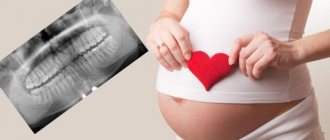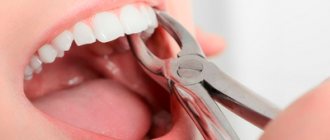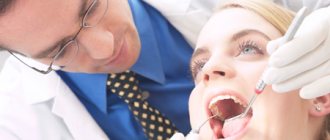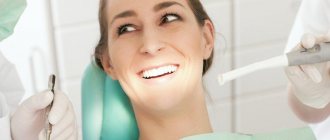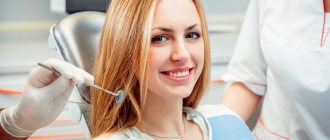Pregnancy is a time when you need to take care of your health, and dentistry plays an important role here. After all, changes in immunity and hormonal levels can lead to teeth becoming more fragile and susceptible to destruction. Therefore, it is best to undergo treatment in advance. But if it doesn’t work out, then doctors have established action algorithms in this regard - what treatment can be carried out and what should not be done.
What is the best thing to do before pregnancy?
Even one pregnancy and breastfeeding of one child can trigger the occurrence of caries or periodontal disease. The risk is much higher if you have twins or two children with a small age difference. Carrying a child requires a lot of the body's resources, and although the doctor may recommend mineral supplements, they are not able to compensate 100% of the losses. Therefore, the strength of the enamel of teeth and their roots is reduced. If there has been no caries, there is a risk that it will appear; if it has already happened, it can quickly develop to the 3-4th stage, and the installed fillings will begin to fall out due to weakening of the tooth tissues.
Therefore, ideally, before planning a pregnancy, it is worth treating all teeth, replacing old fillings, and strengthening the enamel - remineralization. If you have inflammation of the gums, then be sure to undergo treatment to prevent the development of periodontal disease.
Brushing your teeth is good!
Everyone knows well that pregnancy is a special state of the body and a very important period in the life of every woman, during which the most ordinary things, products, and actions are prohibited. During pregnancy, for example, you cannot use certain types of decorative cosmetics, you cannot dye your hair, and you cannot frequently come into contact with aggressive chemical compounds that normally do not pose any threat to health. Some time ago, it was considered harmful to carry out any dental procedures during pregnancy, which was explained by the negative impact of the mother’s emotional stress on the fetus, as well as the possible negative impact of medications used in the treatment of the child on the intrauterine development.
Today, the opinion regarding dental treatment for pregnant women has changed dramatically and an examination by a dentist is one of the first measures that every expectant mother should take. As for professional teeth cleaning at the dentist, there are some restrictions when using mechanical or chemical cleaning methods, but do not affect ultrasonic teeth cleaning.
Moreover, ultrasonic teeth cleaning is a very useful hygienic procedure during pregnancy, as it prevents the development of various dental diseases, as well as inflammatory diseases of the oral cavity, the risk of which increases several times during this period. If a woman is afraid to have her teeth cleaned with ultrasound because of possible pain, the specialists of our dental clinic will offer to numb the treatment area, using gentle anesthetics that will not cause any harm to either the health of the mother or the body of the unborn baby.
What treatment can be done during pregnancy?
- Any emergency treatment
Toothache is not just an unpleasant symptom, but a signal that an acute process has already begun. The pain is difficult to bear, and taking painkillers is not recommended for pregnant women, at least without consulting a doctor. Moreover, if the pain weakens or disappears on its own, this is even worse - it means that the nerve of the tooth has begun to deteriorate. Serious inflammation of the gums or periosteum can begin unnoticed. Also, during pregnancy, general immunity decreases, which creates an increased risk that the infection will spread and pose a threat to the health of both mother and child.
Deep caries threatens the development of complications
For any toothache, it is definitely recommended to immediately go to the clinic and undergo treatment. There are anesthesia drugs that can be used when treating pregnant women, and there are also approved antibiotics (prescribed by a doctor). There will be no harm from them, but the risks from lack of treatment are great.
- Planned treatment of caries
If it was not possible to cure the tooth in advance or caries developed quickly after pregnancy, it is better not to wait until pain arises and emergency treatment is required, but to consult a dentist as soon as possible. The optimal time for this is after the 12th week of pregnancy. As we have already said, treatment will not harm the health of the unborn child, but its absence after a few months can lead to complications.
After the birth of a child, it is difficult to visit the clinic in the first months, so postponing treatment until later is not recommended
- Professional hygiene
For those who care about dental health, it is recommended to have professional cleaning – Air Flow or ultrasonic – once every 6-12 months. This procedure does not require anesthesia, it is harmless, but it helps maintain dental hygiene - and therefore maintains their health.
Air Flow and ultrasound – harmless and painless procedures
Pregnancy and ultrasonic teeth cleaning
Currently, professional teeth cleaning at the dentist has become not only a very popular and popular procedure, but is also included in the list of mandatory hygiene procedures for every second person. Among the hardware methods of teeth cleaning that exist today, ultrasonic cleaning occupies one of the first places, as it is highly effective, does not cause any harm to tooth enamel, and is absolutely painless. In this regard, ultrasonic teeth cleaning during pregnancy does not have any special contraindications, except in cases where a woman has any diseases that are included in the list of absolute contraindications to the use of this technique.
Learn more about the benefits of teeth whitening and teeth cleaning
Procedures that should not be done
- Installation of veneers or aesthetic fillings
Although it is not considered a risky procedure, it is nevertheless not recommended. The reason is that any medical interventions during pregnancy should be carried out only when indicated. Aesthetic problems can be solved after the birth of a child.
- Whitening
The reason is the same - the procedure is not therapeutic - it can be postponed until later. In addition, now all medical drugs and equipment are certified; for this purpose, studies are carried out, in which pregnant women usually do not participate. Therefore, there is a formal ban.
- Treatment by an orthodontist
It would seem that wearing braces while on maternity leave is a great idea, because you don’t have to go to work or communicate with colleagues. But in fact, many orthodontists are against this decision. Firstly, during pregnancy and subsequent breastfeeding, bone tissue density may temporarily decrease and the course of treatment will differ from the standard. It is difficult to predict this, so to some extent such a procedure is risky. Secondly, immediately after the birth of a child, a woman cannot always leave him to go to the clinic for an appointment on the appointed day. And it is very undesirable to postpone visits to the orthodontist - it is not recommended to violate the treatment schedule.
It is much easier to choose clear aligners that are invisible to others, and undergo treatment when it is truly convenient for you.
There is no need to “hide” with aligners; the treatment goes unnoticed by others
Thus, the general opinion of dentists is:
- Treatment should be carried out before pregnancy or after 12 weeks.
- Do not put off treatment until later.
- On the contrary, all aesthetic procedures can be completed after the birth of the baby.
Other articles:
- What is more profitable – aligners or braces?
- Reflections braces - their advantages
Why might an expectant mother refuse to cleanse?
In addition to medical contraindications, there may be a number of personal reasons why it is recommended to avoid in-office teeth cleaning during pregnancy.
The first factor is purely psychological, but it is also the most important. If a woman is nervous when visiting a dental clinic, then there is no need to carry out cleaning unless indicated (only according to indications). It is impossible to worry the expectant mother, much less make her very nervous and experience discomfort. There are cases when you cannot do without the help of a doctor - with gingivitis, which pregnant women often suffer from, acute pain, caries, etc. Professional cleaning can usually be delayed for several months.
The second important factor is also largely related to the psychological state. If teeth are highly sensitive, even men and women who are not expecting a child are often advised to avoid ultrasonic cleaning. It can make teeth even more sensitive, which will lead to additional stress for the expectant mother.
Is it possible to treat teeth during pregnancy?
You can and should treat your teeth! But depending on the stage of pregnancy and the condition of the fetus, some procedures will have to be abandoned, while others will have to be carried out with extreme caution. The safest period for dental treatment is the second trimester of pregnancy. At this time, the placenta and vital organs of the baby have already formed, but the fetus is not yet so large that there is a threat of miscarriage.
Up to three weeks, the fetus is vulnerable to any interference in the body. At this time, dental procedures are contraindicated. If the situation is serious (for example, exacerbation of pulpitis or periodontitis), treatment is necessary. The development of the disease is more dangerous than medical intervention. In the third trimester, the fetus is also sensitive to external influences. Dental treatment for pregnant women in later stages should be carried out if there is an urgent need, because stress and pain have a negative impact on the nervous system of the mother and child. A special approach is taken for pregnant patients. For example, in the third trimester it is contraindicated for a woman to lie on her back for a long time, so during treatment the expectant mother is placed slightly on her side. This is a more comfortable position for the fetus and the patient.
How to care for your teeth after ultrasonic cleaning
During the recovery period after ultrasonic cleaning, the gums and enamel are slightly weakened, and because of this they are very easy to damage. Taking this into account, after removing plaque and tartar, you must follow some rules:
- for several days after the procedure, it is advisable not to eat food that can lead to staining of tooth enamel (beets, carrots, coffee, black tea);
- After every meal, brush your teeth;
- To prevent food remnants from starting to deposit in the dental pockets again, after eating you must use toothpicks, dental floss, and special dental brushes for cleaning;
- If you properly perform oral hygiene, you can keep your teeth and gums healthy for as long as possible, and visit the dentist only for preventive purposes.
To prevent gum disease, you need to frequently eat solid foods, preferably fruits and vegetables.
Comprehensive services
| Name of service | Cost, rub |
| Medium caries chemical curing filling | 1800 |
| Deep caries light-curing filling | 3850 |
| Pulpitis of a three-canal tooth (treatment in two visits) 2 visits | 7950 |
| Implantation operation (1 operation) | 19900 |
Therapeutic dentistry
| Name of service | Cost, rub |
| Initial consultation, drawing up a treatment plan | 1000 |
| Application of an insulating gasket (1 tooth) | 100 |
| Treatment of moderate caries with placement of a chemical-curing filling | 1700 |
| Injection anesthesia (1 injection) | 300 |
| Insulating gasket (1 tooth) | 100 |
| Treatment of deep caries with placement of a filling made of light-curing materials (1 tooth) | 3450 |
| Application of antibacterial drugs (1 tooth) | 300 |
| Endodontic treatment of a three-canal tooth (1 tooth) | 2700 |
| Temporary filling (1 tooth) | 400 |
| Lateral condensation of three canals (1 tooth) | 400 |
| Restoration with light-curing material (1 tooth) | 3550 |
| Removal of dental deposits for mild periodontal disease (All teeth) | 3550 |
| Removal of dental plaque in cases of moderate and moderate periodontal disease (All teeth) | 3650 |
Surgical dentistry
| Name of service | Cost, rub |
| Tooth extraction (without anesthesia): - simple (1 tooth) | 3650 |
| Removal of a mobile tooth (excluding anesthesia) | 3650 |
| Tooth extraction (without anesthesia): - complex (1 tooth) | 1280 |
| Tooth extraction (without anesthesia): - with the formation of a mucoperiosteal flap and suturing (1 tooth) | 4650 |
| Dressing a wound in the mouth | 200 |
| Treatment of alveolitis with socket revision | 2000 |
| Intraoral incision with wound drainage | 2000 |
| Biohorizon system implant USA (1 implant) | 18000 |
Orthopedic dentistry
| Name of service | Cost, rub |
| Cast crown with minimum wage (without work) unit | 2600 |
| Cast crown with plastic lining with minimum wage (without work) unit | 3100 |
| Metal-ceramic crown on a cast frame (without work) unit | 5950 |
| Prosthesis repair (base fracture, tooth welding) 1 type of work | 700 |
| Complete removable denture (no work) denture | 9200 |
| Nylon prosthesis (no work) prosthesis | 23000 |
| Metal clasp prosthesis with locks (without operation) prosthesis | 30000 |
Stages of ultrasonic teeth cleaning
As we can see, professional oral hygiene does not harm the health of a pregnant woman, and even, on the contrary, has a beneficial effect. The procedure can take from 20 to 40 minutes, the duration depends on the degree of contamination of the enamel. Using a scaler, the doctor removes supragingival and subgingival deposits, then cleans plaque from the surface of the teeth.
The solution used, coming from a special apparatus, contains abrasive substances and is made on the basis of soda. It carefully cleans the enamel without damaging the mucous membrane. Finally, the specialist polishes the surface of the teeth and coats them with fluoride varnish.
